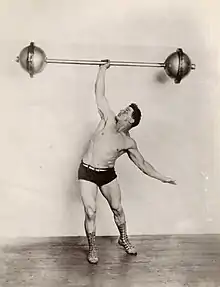двигнѫти
Old Church Slavonic

двигнѫти
Etymology
From Proto-Slavic *dvignǫti.
Verb
двигнѫти • (dvignǫti) pf
- to lift, raise
- Mark 11:23, from Codex Marianus, 2112300-2112320:
- иже речетъ горѣ сеи · двигни сѧ и въвръѕи сѧ въ море · ꙇ не ꙋсѫмьнитъ сѧ въ с꙯рдци своемь · нъ вѣрѫ иметъ · ѣко еже г꙯лтъ бꙑваатъ ·
- If anyone says to this mountain, ‘be lifted up and thrown into the sea,’ and has no doubt in his heart but believes that it will happen, it will be done for him.
- Mark 11:23, from Codex Marianus, 2112300-2112320:
- to move, shake
- Luke 6:48, from Codex Marianus, 3064810-3064820:
- наводию же бꙑвъшꙋ · припаде рѣка храминѣ тои · ꙇ не може двигнѫти еѩ · основана бо бѣ на камене ·
- And when a flood arose, the stream brake against that house, and could not shake it: because it had been well builded.
- Luke 6:48, from Codex Marianus, 3064810-3064820:
Conjugation
| 👤 singular | 👥 dual | 👤👥👥 plural | |||||||||||||||
|---|---|---|---|---|---|---|---|---|---|---|---|---|---|---|---|---|---|
| азъ (azŭ) | тꙑ (ty) | тъ (tŭ) | вѣ (vě) | ва (va) | та (ta) | мꙑ (my) | вꙑ (vy) | ти (ti) | |||||||||
| двигнѫ (dvignǫ) | двигнeши (dvigneši) | двигнeтъ (dvignetŭ) | двигнeвѣ (dvignevě) | двигнeта (dvigneta) | двигнeте (dvignete) | двигнeмъ (dvignemŭ) | двигнeте (dvignete) | двигнѫтъ (dvignǫtŭ) | |||||||||
Derived terms
- движеньѥ (dviženĭje)
- въздвигнѫти (vŭzdvignǫti), въздвижение (vŭzdviženie), въздвигъ (vŭzdvigŭ)
- подвигнѫти (podvignǫti), подвижение (podviženie), подвигъ (podvigŭ)
- придвигнѫти (pridvignǫti)
- прѣдвигнѫти (prědvignǫti)
- съвъздвигнѫти (sŭvŭzdvignǫti)
- съподвигнѫти (sŭpodvignǫti)
Related terms
Further reading
- Cejtlin, R.M.; Večerka, R.; Blagova, E., editors (1994), “двигнѫти”, in Staroslavjanskij slovarʹ (po rukopisjam X—XI vekov) [Old Church Slavonic Dictionary (Based on 10–11th Century Manuscripts)], Moscow: Russkij jazyk, page 185
- Hauptova Z., editor (1958–1997), “двигнѫти”, in Slovník jazyka staroslověnského (Lexicon linguae palaeoslovenicae), volume 1, Prague: Euroslavica, page 469
- Hauptova Z., editor (1958–1997), “двигновениѥ”, in Slovník jazyka staroslověnského (Lexicon linguae palaeoslovenicae), volume 1, Prague: Euroslavica, page 469
- Hauptova Z., editor (1958–1997), “подвигновениѥ”, in Slovník jazyka staroslověnského (Lexicon linguae palaeoslovenicae), volume 3, Prague: Euroslavica, page 92
Old East Slavic
Etymology
From Proto-Slavic *dvignǫti. Cognates include Old Church Slavonic двигнѫти (dvignǫti) and Old Polish dźwignąć.
Pronunciation
Conjugation
Conjugation of двигнѫти (type II verb)
| Singular | Dual | Plural | ||
|---|---|---|---|---|
| Present | 1st | двигнѫ dvignǫ |
двигневѣ dvignevě |
двигнемъ dvignemŭ |
| 2nd | двигнеши dvigneši |
двигнета dvigneta |
двигнете dvignete | |
| 3rd | двигнеть dvignetĭ |
двигнета dvigneta |
двигнѫть dvignǫtĭ | |
| Aorist | 1st | двигнѫхъ dvignǫxŭ |
двигнѫховѣ dvignǫxově |
двигнѫхомъ dvignǫxomŭ |
| 2nd | двигнѫ dvignǫ |
двигнѫста dvignǫsta |
двигнѫсте dvignǫste | |
| 3rd | двигнѫ dvignǫ |
двигнѫста dvignǫsta |
двигнѫша dvignǫša | |
| Imperfect | 1st | двигѧхъ dvigęxŭ |
двигѧховѣ dvigęxově |
двигѧхомъ dvigęxomŭ |
| 2nd | двигѧше dvigęše |
двигѧста dvigęsta |
двигѧсте dvigęste | |
| 3rd | двигѧше dvigęše |
двигѧста dvigęsta |
двигѧхѫ, двигѧхѫть dvigęxǫ, dvigęxǫtĭ | |
| Imperative | двигни dvigni |
двигнѣта dvigněta |
двигнѣте dvigněte | |
| Cohortative | — — |
двигнѣвѣ dvigněvě |
двигнѣмъ dvigněmŭ | |
| Present Active Participle | Present Passive Participle | Past Active Participle | Past Passive Participle | |
| двигна dvigna |
двигномъ dvignomŭ |
двигнъ dvignŭ |
движенъ dviženŭ | |
| L-Participle | Infinitive | Supine | ||
| двигнѫлъ dvignǫlŭ |
двигнѫти dvignǫti |
двигнѫтъ dvignǫtŭ | ||
Descendants
References
- Sreznevsky, Izmail I. (1893), “двигнꙋти”, in Матеріалы для Словаря древне-русскаго языка по письменнымъ памятникамъ [Materials for the Dictionary of the Old East Slavic Language Based on Written Monuments] (in Russian), volume 1 (А – К), Saint Petersburg: Department of Russian Language and Literature of the Imperial Academy of Sciences, column 638
This article is issued from Wiktionary. The text is licensed under Creative Commons - Attribution - Sharealike. Additional terms may apply for the media files.